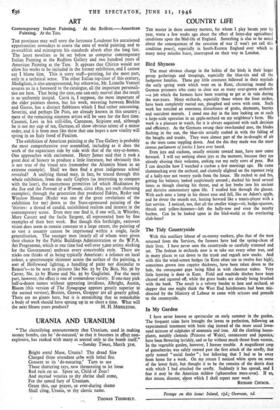Bird Shyness The most obvious change in the habits of
the birds is their larger group gatherings and troopings, especially the blue-tits and all the hedgerow families. These gay little creatures followed in their myriads the early spring work which went on in Kent, chattering round the German prisoners who came to clear out so many over-grown orchards —a job which the farmers have been wanting to get at in vain during the war-years. Many orchards, especially those where the frost strikes, have been completely rooted out, ploughed and sown with corn. Such work has entailed an enormous disturbance of grubs, dormants, berries and succulent morsels. I stood one day in the lane looking on at such a large-scale operation in an apple-orchard on my neighbour's farm. His work is a pleasure to watch, for it is always organised with such decision and efficiency. As the Germans swung their two-handed axes, the blades flashing in the sun, the blue-tits actually rushed in with the falling of the boughs and trunks. They were almost part of the in-draught of air as the trees came toppling down. And the din they made was the most riotous parliament of fowles I have ever heard.
Even jays and cuckoos, usually reticent toward man, have now come forward. I will say nothing about jays at the moment, because they are already abusing their welcome, seeking out my early rows of peas. But I can describe how I watched a cuckoo a few mornings ago. He came slummocking over the orchard, and clumsily alighted on the topmost twig of a holly-tree not twenty yards from the house. He rocked to and fro, getting his balance; looked suspiciously around ; ducked his head several times as though clearing his throat, and at last broke into his ancient and derisive commentary upon life. I studied him through the glasses. With each note a lump in his throat rose and fell, like an Adam's apple, and he threw the sounds out, leaning forward like a tennis-player with a fast service. I noticed, too, that all the smaller wings—tit, hedge-sparrow, thrush and yellow-hammer—left the holly-tree and even the nearby bushes. Can he be looked upon in the bird-world as the everlasting club-bore?


























 Previous page
Previous page